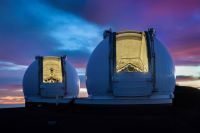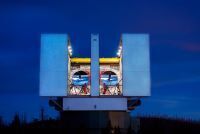Astronomy/Astrophysics
What is the origin of the universe, its constituent elements, and the cosmic structure, stars and planets that are necessary for life? The Notre Dame Astronomy and Astrophysics Group includes faculty, research scientists, postdoctoral scholars, graduate students, and undergraduates conducting cutting-edge research in several disciplines of astrophysics. We lead major observational surveys through partnerships with world-class telescopes, including the W. M. Keck Observatory and the Large Binocular Telescope, as well as competitively awarded observational programs on the NASA >James Webb Space Telescope and the Hubble Space Telescope. We are building new state-of-the art instruments for some of these facilities. We are also a leader in experimental and theoretical nuclear astrophysics and particle astrophysics, in collaboration with the Notre Dame Institute for Structure and Nuclear Astrophysics (ISNAP) and the Center for Astrophysics at Notre Dame University (CANDU).
Areas of active research include:
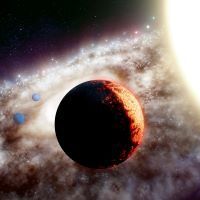
Exoplanets
Jeff Chilcote, Justin Crepp, Lauren Weiss
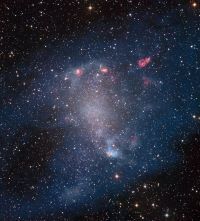
Image credit: ESO/NAOJ/NRAO
Stars and the Milky Way
Borja Anguiano, Tim Beers, Evan Kirby
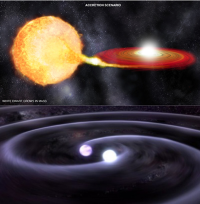
Supernovae, Compact Objects, and Nucleosynthesis
Peter Garnavich, Evan Kirby, Grant Mathews, Rebecca Surman
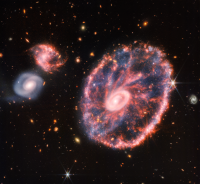
Galaxies
Chris Howk, Nicolas Lehner
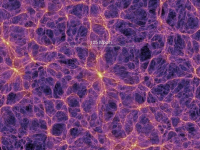
Cosmology/Large Scale Structure
Grant Mathews, Lan Nguyen, Lara Arielle Phillips
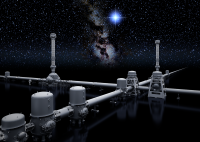
Gravitational Wave Astronomy
Lan Nguyen
Hydrodynamical Models
Dinshaw Balsara
Our ongoing research includes projects spearheaded by the following faculty members:
- Borja Anguiano – the origin and evolution of stellar systems in the Milky Way and Local Group galaxies using muti-object multi-wavelength massive stellar spectroscopic surveys.
- Dinshaw Balsara -- computational applications in the areas of interstellar medium, turbulence, star formation, planet formation, the physics of accretion disks, compact objects, and relativistic astrophysics [MHD video]
- Timothy Beers -- the origin and evolution of the elements of the Universe, and the assembly of large spiral galaxies such as the Milky Way. He has designed and executed large-scale surveys of stars in the Milky way, efficiently sifting through literally millions of individual stars in order to find rare objects that illuminate the early chemical evolution of our Universe.
- Jeff Chilcote -- a specialist in the construction of infrared astronomical instruments and direct imaging of extra solar planets
- Justin Crepp -- development of new technologies to detect and study planets orbiting stars other than the Sun, called exoplanets
- Peter Garnavich -- the study of supernovae and their diversity
- Evan Kirby – the origin of the elements of the periodic table, the chemical evolution of galaxies, stellar spectroscopy, building efficient spectrographs
- J. Christopher Howk -- work to understand the evolution of the gaseous components of galaxies and the build up of elements since the Big Bang
- Nicolas Lehner -- research focuses on understanding the physical processes that drive and regulate the growth of galaxies
- Grant Mathews (Director of CANDU) -- various aspects of nuclear and particle astrophysics and cosmology including numerical simulations of core collapse supernovae, studies of neutrino interactions and nucleosynthesis in supernovae, as well as various aspects of the Big Bang including constraints from Big Bang nucleosynthesis and the cosmic microwave background on the origin and evolution of the universe, the early moments of the inflating universe, constraints on massive particles and their decay in the early universe, constraints on time-dependent fundamental constants in the early universe, studies of galaxy formation and their chemical evolution along with studies of general relativist hydrodynamics, stellar evolution, and merging binary neutron stars.
- Lan Q. Nguyen – studies of sources of gravitational radiation and effects of dark matter and dark energy on structure formation
- Lara Arielle Phillips -- the interplay between galaxies and the largest structures in the Universe.
- Rebecca Surman -- theoretical/computational nuclear astrophysics with a particular interest in the origins of the heaviest elements
- Lauren Weiss – discovering exoplanets and measuring their fundamental properties
Astrophysics faculty members
Borja Anguiano, Dinshaw Balsara, Timothy Beers, Jeffrey Chilcote, Jonathan Crass, Justin Crepp, Keith Davis, Peter Garnavich, Chris Howk, Evan Kirby, Nicolas Lehner, Grant Mathews, Quynh Lan Nguyen, Arielle Phillips, Rebecca Surman, and Lauren Weiss
